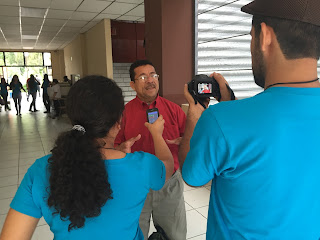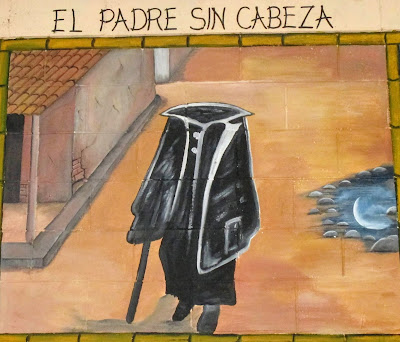Student for a Day
The forum was entitled Seguridad y Soberanía Alimentaria en El Salvador - Food Security and Sovereignty in El Salvador. The event was hosted by the University of El Salvador and featured speakers and honored guests from a number of ecologically-focused organizations, including the Salvadoran Lutheran Church, which is how I happened to be invited.
In previous visits to the university, Pastor Santiago and I have met with student groups and visited with faculty connected to students from the church. This was the type of meeting I was expecting, but as I wandered onto the campus, found the economics quad, saw the large number of people in line outside the auditorium and learned Pastor Santiago was an honored guest, I realized this was something different.
Pastor Santiago and I sat in the front of the lecture hall with other invited guests. The hall was filled with fifth year economics students, for whom this was a required event. About 20 of the senior students who wore bright blue t-shirts were facilitating the event as well as conducting interviews with various eco leaders and activists, including Pastor Santiago. By the time the first speaker began, the room was so crowded that students were sitting on the floor. I pulled out my notebook -- this event was right up my alley. This was going to be a fantastic learning opportunity.
OK, so, a really, really long time ago, I was a university student, and I actually took a class in economics. However, following these amazing speakers with the data they presented in a language which is not my first language was exhausting, and exhilarating. The passion with which these speakers charged the students to take their knowledge into their own small communities to effect real change and to work concretely with the government on food justice and ecology issues was infectious.
Stories are typically what stick with me.
Doris Evangelista spoke first about the legislative process for passing a Food Sovereignty law and the progress which has been made through activism. (Food Sovereignty means a country, like El Salvador, will grow its own food for its own people. Trade agreements and multi-national corporate interests have great force in determining what products are grown on the land and what practices are used.) The speaker gave students specific instructions about how they can attend legislative hearings and secure meetings with representatives. Then she provided some illustrations from her own research:
In Sonsonate, we talked with agricultural workers as we gathered data for a study of the impact which working in the cane fields has on the campesinos who work in the cane fields or in their own small plots near the fields. One worker said he had searched for years for land to rent. Finally he found a plot and he paid $100 per season to rent the land. Each year, for three years, he grew companion crops together in the plot using healthy practices and was able to grow enough to feed his family. This year he went to the owner to pay his rent and the owner said the plot was no longer available. The sugar cane producer (with a large field of production nearby) offered significantly more money to rent the plot and grow cane.
This is the way in which small farmers have lost access to land, and the way in which production of food to eat has given way to production of sugar to sell and production of hunger in poor families.
We talked to another farmer in Sonsonate who had rented a small plot to grow loroco. He had a beautiful crop almost ready to harvest. Then the cane producer sprayed weed killer all over the cane field and it killed the loroco. The farmer went to the cane producer to complain, but was told that is the risk you take when you rent land next to the cane field.
And then there is water. In the Bajo Lemma (Lemma River Basin) we talked to a campesino who had a small plot of crops. During the drought he watered his plot from the river, then it was dry. The water table had fallen so low that he could not get water from a well. Nearby, the grand sugar cane fields had sprinklers running, day and night. He had to watch his crops die because the cane stole all the water.
El Salvador we negotiated a trade deal with China to export sugar and everyone was applauding because this would bring economic development. But what did it really bring? Cancer, Renal insufficiency. Babies born with renal insufficiency. Less access to land to grow food. Economic development for whom?
In previous visits to the university, Pastor Santiago and I have met with student groups and visited with faculty connected to students from the church. This was the type of meeting I was expecting, but as I wandered onto the campus, found the economics quad, saw the large number of people in line outside the auditorium and learned Pastor Santiago was an honored guest, I realized this was something different.
Pastor Santiago and I sat in the front of the lecture hall with other invited guests. The hall was filled with fifth year economics students, for whom this was a required event. About 20 of the senior students who wore bright blue t-shirts were facilitating the event as well as conducting interviews with various eco leaders and activists, including Pastor Santiago. By the time the first speaker began, the room was so crowded that students were sitting on the floor. I pulled out my notebook -- this event was right up my alley. This was going to be a fantastic learning opportunity.
OK, so, a really, really long time ago, I was a university student, and I actually took a class in economics. However, following these amazing speakers with the data they presented in a language which is not my first language was exhausting, and exhilarating. The passion with which these speakers charged the students to take their knowledge into their own small communities to effect real change and to work concretely with the government on food justice and ecology issues was infectious.
Stories are typically what stick with me.
Doris Evangelista spoke first about the legislative process for passing a Food Sovereignty law and the progress which has been made through activism. (Food Sovereignty means a country, like El Salvador, will grow its own food for its own people. Trade agreements and multi-national corporate interests have great force in determining what products are grown on the land and what practices are used.) The speaker gave students specific instructions about how they can attend legislative hearings and secure meetings with representatives. Then she provided some illustrations from her own research:
In Sonsonate, we talked with agricultural workers as we gathered data for a study of the impact which working in the cane fields has on the campesinos who work in the cane fields or in their own small plots near the fields. One worker said he had searched for years for land to rent. Finally he found a plot and he paid $100 per season to rent the land. Each year, for three years, he grew companion crops together in the plot using healthy practices and was able to grow enough to feed his family. This year he went to the owner to pay his rent and the owner said the plot was no longer available. The sugar cane producer (with a large field of production nearby) offered significantly more money to rent the plot and grow cane.
This is the way in which small farmers have lost access to land, and the way in which production of food to eat has given way to production of sugar to sell and production of hunger in poor families.
We talked to another farmer in Sonsonate who had rented a small plot to grow loroco. He had a beautiful crop almost ready to harvest. Then the cane producer sprayed weed killer all over the cane field and it killed the loroco. The farmer went to the cane producer to complain, but was told that is the risk you take when you rent land next to the cane field.
And then there is water. In the Bajo Lemma (Lemma River Basin) we talked to a campesino who had a small plot of crops. During the drought he watered his plot from the river, then it was dry. The water table had fallen so low that he could not get water from a well. Nearby, the grand sugar cane fields had sprinklers running, day and night. He had to watch his crops die because the cane stole all the water.
El Salvador we negotiated a trade deal with China to export sugar and everyone was applauding because this would bring economic development. But what did it really bring? Cancer, Renal insufficiency. Babies born with renal insufficiency. Less access to land to grow food. Economic development for whom?
 |
| Invited dignitary being interviewed by students |



http://purewaterfortheworld.org/solutions/projects-in-honduras/
ReplyDeleteI'm one of the original members of the Brattleboro, VT Rotary Club committee that started this program, and some of our first pilot projects were in El Salvador around 1998. We'd love to come back!
Jenifer Ambler
amblerj@sover.net